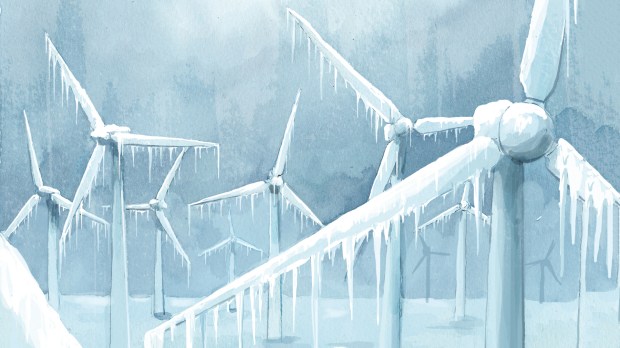For years British energy policy has been an exercise in wishful thinking. We’ve been living in a fantasy world in which Britain can somehow achieve ‘net zero’ by 2050 without paying any serious economic price, and with no one significantly poorer as a result. ‘Not a hair-shirt in sight,’ said the Prime Minister, though most independent assessments said net zero would cost between £36,000 and £50,000 per household.
Reality, now, is biting. Reducing emissions is important but security of supply is vital, and Europe has been forced to come to terms with its dependence on Russian oil and gas. The dependence is so entrenched that it is possible Vladimir Putin thought that Europe would rather leave Ukraine undefended than impose sanctions. If this was Putin’s thinking, it was a miscalculation. Europe has collectively chosen pain. The question is now to ameliorate it.
Boris Johnson has proposed a new energy plan, due this month. The European Union has said it will cut Russian imports by two-thirds by the end of the year: quite an ambition, given that Russia supplies about half of Germany’s gas imports and almost all of that imported by Finland and the Baltic states. A frantic search for alternatives has begun which has ushered in a new era of energy realism. The German Greens are softening in their opposition to nuclear power, and there are signs that No. 10 is letting go of the net zero agenda.
At present, it costs about £1,300 to heat the average home. By some estimates this will rise to £3,000 later this year, and that is before the other inflationary costs of food and basic shopping as a result of the sanctions. As Javier Blas argues in his article, the effect of the Ukraine war is all the greater because so many companies the world over are voluntarily imposing sanctions, compounding the effect of the official measures. Even if the conflict were to reach a swift resolution, relations with Russia are now so bad that sanctions are likely to remain in place for some time.
America is perhaps the least exposed of all western countries. More than a decade ago, it embraced hydraulic fracking technology to release its own gas supplies, and as a result is now self-sufficient in energy. It is no longer dependent on imports and is therefore less exposed to world energy turmoil. Britain had a great opportunity as a result of its huge shale reserves in the north of England. But local opposition inspired Johnson to impose a moratorium on fracking ahead of the 2019 election.
This has left Britain without many alternatives. The North Sea gas fields are run down, without any investment in storage facilities, leaving the UK completely at the mercy of a volatile global market in Liquid Natural Gas. Renewables have improved remarkably, and now generate about a third of domestic power. We have phased out coal. But we remain hugely dependent on gas – and horribly exposed to the staggering price increases. We can expect power cuts when the wind turbines we now rely on fail in calm weather. Against such a backdrop, net zero can’t last. The UK needs a grown-up energy policy instead.
The first step would be to dramatically increase production of our own oil and gas. Fields in the North Sea need to be brought back onstream, and we need urgently to restart fracking and exploiting the vast reserves of oil and gas in the north of England. Jobs and tax revenues would follow, and so as well as providing energy security, this might also be an opportunity to level up.
Advances in technology have already helped Britain reduce its carbon emissions more over the past decade than any other G20 country. The free market and innovation give us new ways to get more from less. Cars need far less petrol to travel the same distance, and the entire economy is becoming less energy-intensive. It’s far from clear that massive green levies and huge government bribes are the only way to achieve a cleaner, greener future – especially given the increasing consumer demand for low-carbon, low-waste lifestyles.
The UK should retain its status as a world leader in reducing carbon emissions, but it should not try to go further and faster than our major industrial rivals. That would come at too great a political and economic cost, with no significant benefit to the planet. We need a joined-up energy policy that combines security of supply, economic stability and geopolitical realism. Electric cars and heat pumps can wait until they are affordable for the average household.
The need for a new energy plan presents the Prime Minister with an opportunity. If Robert Habeck, the leader of the German Greens, can find it within himself to put in place plans for a strategic coal reserve to wean his country off Russian gas, than surely Johnson – a politician with the lightest of ideological baggage – can move on from his commitment to net zero. He doesn’t need to disavow it; he can just let it drop. There are new priorities now, and we can lose no time in addressing them.
Got something to add? Join the discussion and comment below.
Get 10 issues for just $10
Subscribe to The Spectator Australia today for the next 10 magazine issues, plus full online access, for just $10.
You might disagree with half of it, but you’ll enjoy reading all of it. Try your first month for free, then just $2 a week for the remainder of your first year.














Comments
Don't miss out
Join the conversation with other Spectator Australia readers. Subscribe to leave a comment.
SUBSCRIBEAlready a subscriber? Log in